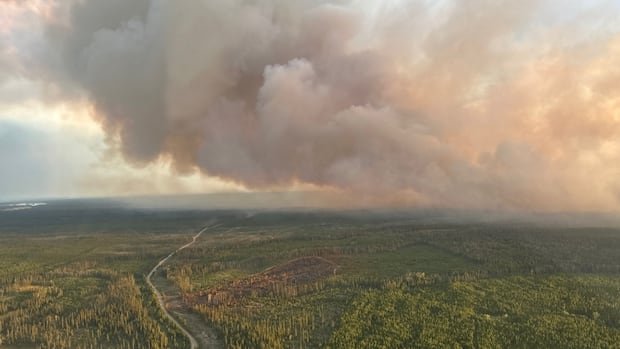Highway 20 in the Chilcotin region of British Columbia has been reopened to traffic following an overnight closure due to the Beef Trail Creek wildfire. However, the Coquihalla Highway, connecting the Lower Mainland with the Interior, remains closed between Merritt and Hope due to an uncontrollable wildfire in the area.
The Coquihalla Highway (Highway 5) closure is a result of the Mine Creek wildfire, which has expanded to approximately 19 square kilometers since its initial discovery on Monday. The Ministry of Transportation states that the Coquihalla will resume operations once visibility improves and travel conditions are deemed safe. DriveBC has advised alternative routes via Highway 1 or Highway 3.
A social media video shared on Wednesday depicts vehicles passing by trees engulfed in flames along the highway before its closure in the afternoon. The BC Wildfire Service reports that the Mine Creek wildfire intensified to Rank 5 behavior on Wednesday due to extreme heat and strong winds, resulting in a vigorous surface fire.
Evacuation orders have been issued for the Coquihalla Lake area, including the Coquihalla Lakes Lodge and Coquihalla Summit Snowmobile Club, with the rest stop area on evacuation alert. The BCWS suspects the fire was ignited by lightning strikes.
Additionally, the Beef Trail Creek wildfire, measuring around 93 square kilometers as of Thursday afternoon, has led to evacuation orders for specific land parcels and Ulkatcho First Nation reserves. Evacuation alerts are in effect for areas near Bosk and Dusty lakes, impacting a small number of individuals under evacuation orders and a larger group under alert status.
In a separate incident, a drone flying in restricted airspace collided with a firefighting aircraft in the Cariboo region on Tuesday evening. The BCWS emphasized the dangers of operating drones near wildfires, highlighting the risks posed to public safety and firefighting operations.
Furthermore, poor air quality caused by ongoing wildfires in British Columbia has prompted special air quality statements in 32 regions, including Metro Vancouver, with smoky conditions expected to persist. The province anticipates increased wildfire activity due to forecasted lightning strikes and recent high temperatures.
Record-breaking temperatures have been recorded in British Columbia, with Cache Creek setting a new Canadian record of 40.8 degrees Celsius on Wednesday. Environment Canada has issued heat warnings in several areas, including the Fraser Canyon and Thompson regions, as temperatures continue to soar.


